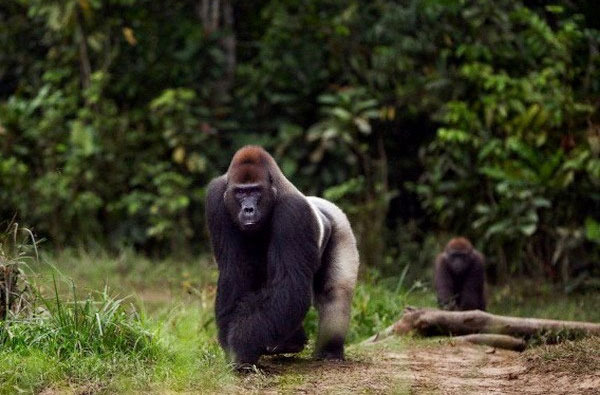Gorillas can actively use body odor to communicate
New research on gorillas has shown that silver-backed gorillas can report their presence with foul smells, or stop smelling odor to evade strangers.
The researchers came to this conclusion after tracking and smelling a male gorilla for months, and this finding suggests that gorilla-like primates can use the smell to communicate in Subtle social situations.
This result was shared by Phyllis Lee, a co-author of the study, a primate psychologist at the University of Stirling, Scotland, with Live Science magazine.
At the top of the small groups are many gorillas and their children are male monkeys. When male monkeys reach adulthood, they will wandering alone until they can build their own 'harem' .
Male monkeys will be able to launch fierce competition to fight the female monkeys, and they can even kill baby monkeys or other animals in the group. Most gorillas have the ability to settle these disputes by marketing - banging their hands on their chests, calling and screaming.
Gorillas communicate with many different voices, and are said to be unable to communicate by smell. Part of the reason is because the size of the part of the brain that senses the smell of the gorilla has shrunk in the evolution of primates, and another part is due to the non-leaf-primate primates - an organ. The feeling of being able to sense pheromones emanating from other animals.

Photo: corbisimages.com
However, Lee said, for many years, gorilla researchers like Dian Fossey have suggested that every gorilla has a pungent odor similar to its own musk.
Thus, Lee and co-author Michelle Klailova, also a primate research psychologist at the University of Stirling, spent 12 months tracking a silver-backed male monkey in the Central Republic's rain forest. Africa while the monkey takes care of its harem and drives off competitors. Lee also said that the male monkey was named by Makumba , a male dominated, and its offspring had a high survival rate.
During this time, the research team mobilized independent researchers to detect the smell of Makumba. Lee said that Makumba emitted the smell of his body when he met other gorillas, as if to say 'I'm healthy, powerful and here, protecting the females and the offspring'.
At other times, when strange silver back monkeys appear and can threaten the monkey group of Makumba, it immediately stops smelling.
'We think it's trying not to tell other males who it is and where it is ,' Lee said.
The smell of body is not delicate enough to be turned into a language, Lee emphasized. However, Makumba's body odor changes according to the situation, such as when the youngest child is nearby or with his mother, when the harem of its female monkey is there, or when it is available strange monkeys lurking around.
Lee argues that Makumba can quickly control its ability to smell smells in delicate social situations, suggesting that this ability is more or less consciously controlled, not just a reaction. apply when fear or irritation.
Makumba's ability also suggests that body odor plays a more important role in primates communication than we thought. Lee thinks that other monkeys, such as chimpanzees, may also use a similar smell. Scent is also one of the ways of communicating between people.
"We all use odors to convey many kinds of emotions and desires - we use perfume to emphasize these things," Lee said.
These findings are thought to be very unexpected, since compared to other animals, primates rely very little on their ability to sense smells - Mireya Mayor, a primate who is not involved in the study, is currently working. The work at the center of ValBio at Stonybrook University in New York said.
'The most unexpected thing is that they can control and control the body odor in a conscious way ,' Mayor said. On the other hand, although the active control of the body's odor secretes sounds strange. But people can also consciously control basic physiological processes such as heart rate - and genetically, humans are relatively close relatives of gorillas.
- Body odor from a scientific perspective
- The secret to eliminating body odor during summer days
- How to choose food to limit your body's
- 5 unexpected things you don't know about body odor
- Coming up with perfume
- 4 body odor reveals your health problem
- Found the 'smell of death'
- Body odor changes when near sick people
- The culprit makes the body stink
- Why can't we feel our body odor?
- In the future, the body odor will replace your passport
- How does the body smell?
 Animal 'suffering' after hibernation
Animal 'suffering' after hibernation Why do goats climb well?
Why do goats climb well? Scientists were surprised to see chimpanzees eating turtles
Scientists were surprised to see chimpanzees eating turtles Giant catfish died deadly due to drought in Thailand
Giant catfish died deadly due to drought in Thailand